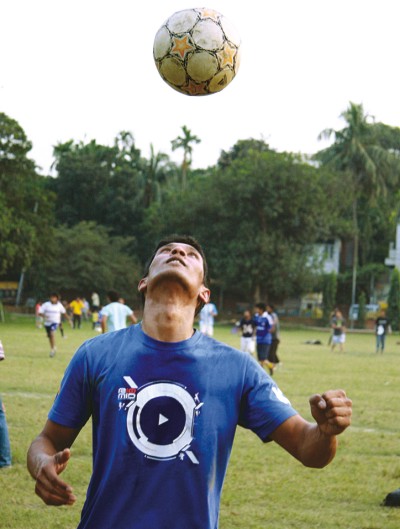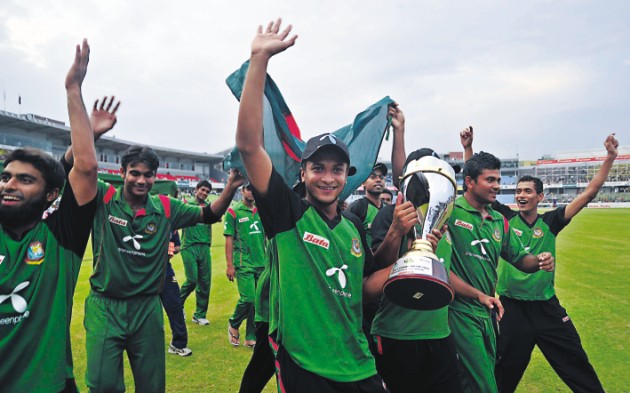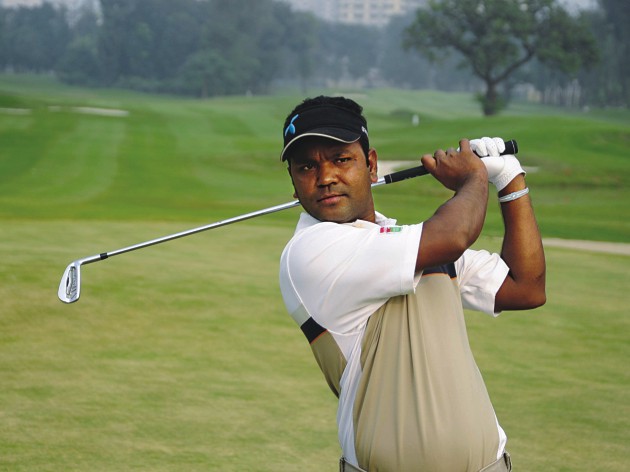
Inside
|
Sporty Forty QUAZI ZULQUARNAIN ISLAM takes stock of the nation's victories and defeats and the way forward in sports.
The young boy diving around in this veritable dustbowl can hardly be eight years old. He is small for his age, and most definitely either a rubbish collector or a beggar plying the roads of Dhaka every day. But in the early hours of this winter morning, kicking around a deflated football in the grassless plains of the Banani playground, he is someone else entirely. "Bangladesh," he shouts as he kicks the ragged football a few yards. His partner in crime could be a twin. He has the same sunken eyes and stick arms that say poverty better than any words ever could. But this morning there is a sparkle in his eyes. They shuffle around vigorously, kicking up enough dust to form a cloud around them but none of it matters. Not too later on, there will be food and a home to think of, or more explicitly, how to get both for the day. But right here and now, the only thing that matters is the football. When they settle enough for me to speak to them, I ask who their favourite player is. They are stumped. I venture further, "Do you watch cricket?" I ask. "Shakib Al Hasan," says the first immediately, with no hesitation. He doesn't even let me finish my question. He rings off other names. These are on the edge of his lips. Evidently, the cricketers are popular. There is now a feisty smile on his lips. This is a topic he knows and he is comfortable with. And as the smile suggests, this gives him joy. This early morning shenanigan is the perfect metaphor for a more macro-outlook on things. Because in a country of 160 million people, most of whom suffer from rampant poverty and increasing inequality, the one tie that binds us all together is sport. And politics of course, but sport is still unique in that it is still the one aspect that unifies us all. Our politics may differ, but our outlook on sport is the same: it gives us something to smile about; it helps us showcase ourselves to the world. It is one of our few positive conduits to the rest of the world. *** The portly Dav Whatmore had a mantra that was unfortunate only in its timing. "We must develop a winning habit," he stressed at press conferences and interviews, even as the Bangladesh cricket team capitulated to loss after loss in the international cricketing arena. As a result, his words became the fodder for many a joke. What winning habit, we said? Here we are, doing our best to not get humiliated and our coach is talking a big game about developing a winning habit! Indeed, at that time, it was amazing that Whatmore could think of winning, with Bangladesh cricket at a nascent stage and doing their best just to keep up its respectability in front of the rest of the world. But what most failed to take into account at that time was the far-sightedness of Whatmore. After all, the Australian is a world champion coach. And you don't become a world champion unless you possess significant quality. So now, some four years after Whatmore last oversaw a Bangladesh training session, the powers that be of Bangladesh cricket are calling for the same and eating humble pie while doing so. On the back of two consecutive series victories over New Zealand and Zimbabwe, and with the World Cup at home about a month away, cricket in Bangladesh stands at the cusp of something, for want of a better term, game-breaking. It seems that, while it might have taken us years to learn to walk, now that we can, we only want to run. With players of the ilk of Shakib Al Hasan and Tamim Iqbal bringing with them a 'devil-may-care' attitude, the Tigers seem finally to be able to live up to their quite considerable sobriquet. Gone are the days of struggling to cope with the demands of international cricket. Bangladesh is now firmly a part of the cricketing elite. We are here to stay. The journey to get here has not been easy. During the early years of Bangladesh, cricket had been very much a second sport to football in terms of its interest value to the public. But it steadily emerged as the sport where we could make the most definitive impact in a world stage. Hence, the last 20 years have shown a marked increase in the interest value of the sport as well as its impact. So much so that, possibly every young professional in the city can lay claim to have received some form of albeit amateurish coaching as a youngster. The result of such mass-driven interest was the Bangladesh cricket team which won the ICC Championship in 1997 and qualified for the World Cup in 1999 before going on to beat Pakistan in the most historic of encounters.
Test status came soon after, and the rest as they say, is history. The key question then is: where do we go from here? To which the most obvious answer is up. At least as far as cricket is concerned, Bangladesh can rest assured that the interest value in the sport is such that there will be an assembly line of cricketers queuing up for a spot in the national team in the near future, if things go according to plan. Of course, there is the possibility that things can go awry but there exists a solid framework, good coaches and the right mix of elements to make this game the launching pad of our sporting success. The World Cup in February is a step in the right direction. The heartbeat of cricket has been centred on the sub-continent and India in particular for a number of years, but Bangladesh had always pointedly missed out on a tri-partite party. Pakistan's troubles, ironically, provide us with the perfect platform to exercise that opportunity. Dhaka and Chittagong will jointly play host to seven World Cup games including two quarterfinals, and, most enticingly, the opening ceremony too will be held at the iconic Bangabandhu National Stadium. It is an opportunity that both the government and the Bangladesh Cricket Board (BCB) have not taken full advantage of. A plethora of tourists are expected to hoard to the capital and its nearby attractions in the near future but one cannot but help feel that despite the tourism board's best efforts and the Local Organizing Committee's (LOC) brave faces, we have missed a beat. And there it lies, the critical problem that hinders the development not just of sport but of most other things in the country: a lack of far-sighted management. In many ways, given our natural resources to shine, this may be the only big problem on the horizon for cricket. Otherwise, as the metaphor goes, our ship has just left port; it should be smooth sailing from here on in. And after all, the winning habit has already been developed. *** Which is more than can be said of football. Very much the country's number two sport at the moment, football has been fighting a somewhat losing battle with its status over the past two decades. This is ironic since, at about the same time, interest in the game on a more international level has peaked to astronomic proportions. Everywhere you look, young adults are adorned in the colours of their chosen club and country. And that is not all. Unlike domestic cricket, which attracts very little audience, football paradoxically often pulls in full houses during special local Cup games. But the local game is also at its absolute lowest ebb. In the halcyon days of the 70s and 80s, football was the dominant sport on the agenda as Bangladesh legends like current Bangladesh Football Federation (BFF) president Kazi Salahuddin traipsed the fields of the land. But even as cricket grew in popularity due to its international appeal, football weaned. It was as if the public did not have room in their heart for both sports. More likely, the lack of quality and international appeal made most lose interest in the game. The erstwhile star, Salahuddin is now two years into his three-year tenure as the president of the game's governing body. And he has tried a number of measures to solve the countless problems that have riddled the game. The biggest worry has been the irregularity with which the game is practised. Football has been notoriously infrequent and even the professional league predictably titled the Bangladesh League exists in a sort of vacuum with no definitive system of relegation or promotion. There is also a distinct lack of sponsors who will be interested in pouring money into the lower echelons of the game. Hence, many talented players lack the momentum that they need to carry them into professional football. The situation is unfortunate because at face value, Bangladesh possesses most of the elements required for a successful football nation. A country of 150 million with a keen interest in the game. Football is being played, albeit amateurishly, almost all over the country. And, as aforementioned, there is an inherent interest in the game and its television coverage. What we sorely lack, and this will hold us back a number of years, is a system that can channel all those resources into something substantive. Administrators have come and gone, but almost all have failed to find the right mix of all those qualities into a workable system. Alongside that, there is a severe shortage of playable fields around the country, and almost no perceivable backward linkage for clubs such as talent hunts and youth schemes for up and coming players. Bangladesh Krira Shikkha Protishtan (BKSP) remains the sole institution focused on sport and even they rate cricket as more important than football.
In an interview late in 2009, the then Bangladeshi coach Edson Silva Dido expressed his worries. "In a country with so much potential in terms of human resource and players it's just shocking to see so many good players go to waste because of the lack of knowledge of the committees and coaches." Indeed, a lack of proper coaching at youth levels seems likely to hold back Bangladesh even as their regional neighbours move ahead at a breakneck pace. Football, more so than any other sport in the world, is changing day by day. Bangladesh sadly, might not last the pace. *** But even as cricket and football fight their cyclical battle for top spot, one man threatens to take away the spotlight from them all. Just five years ago, Siddikur Rahman was a caddie plying the pro-am circuit in the country. Five years before that he was a ballboy at the Kurmitola Golf Club in the city. But as the first Bangladeshi golfer to go professional, Siddikur also recently joined the Asian Tour, a momentous achievement in a country that lacks absolutely any public framework to support the sport of golf. Played mostly in privileged quarters, golf is hardly the sport for a boy from Madaripur, who spent most of his life in a slum in the city's Manikdi area. But Siddikur's natural aptitude for the sport set him apart early and this year after finishing in the first 40 in qualifying school, Siddikur had the opportunity to make an impact on the Asian Tour after he had won four tournaments in four years in the Professional Golf Tour of India. But the pioneer did not stop there. He blazed a trail by also becoming the first Bangladeshi golfer to win a tournament after bagging the Brunei Open in August 2010. The golfer has impressed many in the circuit with his meteoric rise and he has been tipped for stardom. And ironically, the lack of public intervention in the sport of golf, might be a good sign for him, if not for others who want to take up the game. *** The kids at the park do not know Siddikur. They have also never heard of Kazi Salahuddin. But any sporting success brings a smile to their lips as it does to numerous other poverty-ridden people across the country. Sport is a great leveller, perhaps the greatest of them all and for the few who have nothing to smile about, it provides a sort of refuge from their daily misery. 2011 will be a crucial year for sports in Bangladesh. And not just for cricket or football or golf, but for the many other small sports which struggle for a spot of the limelight. Be it shooting, be it kabbadi, many sports are slowly but surely petering out even as other countries move ahead. But the World Cup in 2011 at home soil provides the perfect opportunity for sport to take top spot on the agenda. At no other time will so much public focus be given to it. It remains to be seen if the right quarters can capitalise. Quazi Zulquarnain Islam is a sports journalist.
|


